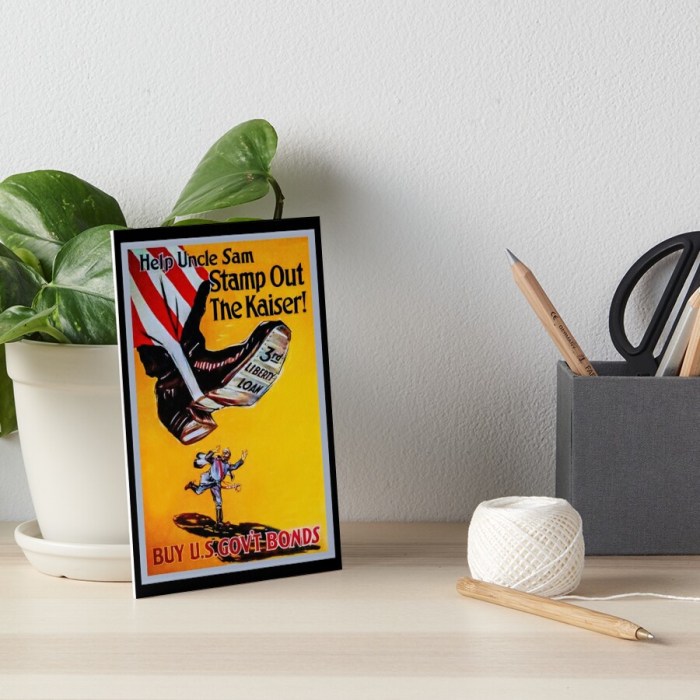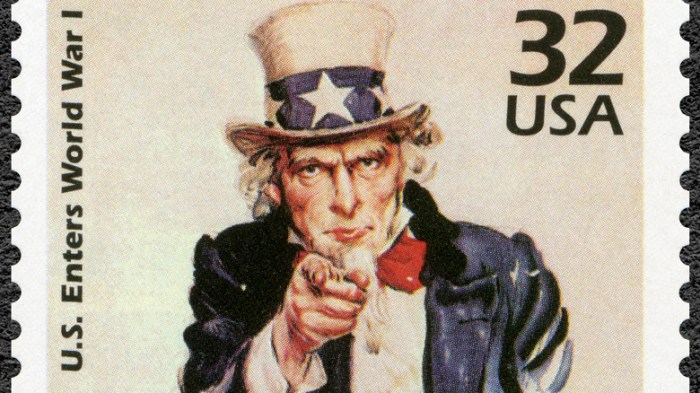In the annals of American history, the slogan “Help Uncle Sam Stamp Out the Kaiser” stands as a potent symbol of national unity and unwavering resolve during the tumultuous years of World War I. This clarion call galvanized the American people, inspiring them to rally behind their government and contribute to the war effort in unprecedented ways.
As we delve into the historical context, symbolism, and impact of this iconic slogan, we will uncover its profound significance in shaping American society and the course of the war.
The slogan emerged as part of a comprehensive propaganda campaign orchestrated by the United States government to mobilize public support for the war against Germany and its authoritarian leader, Kaiser Wilhelm II. The image of Uncle Sam, a personification of the United States, represented the nation’s strength, determination, and unwavering commitment to the cause of liberty and democracy.
Understanding the Slogan “Help Uncle Sam Stamp Out the Kaiser”

The slogan “Help Uncle Sam Stamp Out the Kaiser” emerged during World War I as a rallying cry for American citizens to support the war effort against Germany and its leader, Kaiser Wilhelm II. This slogan was a powerful propaganda tool that reflected the deep-seated animosity towards Germany and its perceived threat to American values and interests.
Symbolism of Uncle Sam and the Kaiser
Uncle Sam, a personification of the United States, symbolized American patriotism and the righteous cause of the war. In contrast, the Kaiser represented the authoritarianism and militarism of Imperial Germany, seen as a threat to democracy and freedom.
Purpose and Target Audience
The purpose of the slogan was to galvanize public support for the war effort by creating a sense of urgency and portraying the conflict as a moral crusade against tyranny. The target audience was the American public, particularly those who were hesitant or opposed to American involvement in the war.
The Kaiser and German Militarism
Kaiser Wilhelm II’s reign marked a period of German expansionism and militarism that significantly influenced the outbreak of World War I. His aggressive foreign policy and the buildup of German military power posed a growing threat to European stability and eventually led to the conflict.
German Military Buildup
Under Kaiser Wilhelm II, Germany embarked on a massive military buildup, rapidly expanding its army and navy. This expansionism was driven by a combination of factors, including the Kaiser’s personal ambitions, the influence of the German General Staff, and the growing rivalry with France and Russia.
- Army Expansion:Germany’s army was significantly enlarged, with the number of soldiers increasing from 540,000 in 1888 to over 800,000 in 1914.
- Naval Expansion:The German navy also underwent a major expansion, with the construction of new battleships, cruisers, and submarines. By 1914, the German navy was the second largest in the world, behind only the Royal Navy of Great Britain.
Impact on Europe
The German military buildup had a profound impact on Europe. It created a sense of insecurity and fear among neighboring countries, particularly France and Russia, who felt threatened by Germany’s growing power.
- Arms Race:The German military expansion triggered an arms race among European powers, as other countries sought to match or surpass Germany’s military strength.
- Diplomatic Tensions:The German military buildup also increased diplomatic tensions between Germany and other European powers, leading to a series of crises and conflicts that eventually culminated in World War I.
Threat to the United States
Although the United States was not directly threatened by Germany’s military buildup, the conflict in Europe had significant implications for American interests. The United States was concerned about the potential for German dominance in Europe and the impact it could have on global power dynamics.
- Economic Interests:The United States had significant economic ties with both Germany and its European rivals, and a German victory in Europe could have disrupted these trade relationships.
- Political Ideals:The United States also feared the spread of German militarism and authoritarianism, which it saw as a threat to its own democratic values.
American Propaganda and Mobilization

The United States government used a variety of propaganda techniques to rally support for the war effort. These techniques included posters, speeches, films, and songs. The propaganda was designed to create a sense of patriotism and to demonize the enemy.
One of the most effective propaganda campaigns was the “Help Uncle Sam Stamp Out the Kaiser” campaign. This campaign used posters and other materials to depict the Kaiser as a brutal tyrant who was responsible for the war. The campaign was very successful in generating support for the war effort.
Use of Propaganda to Rally Support for the War Effort
The American government used a variety of propaganda techniques to rally support for the war effort. These techniques included:
- Posters:Posters were one of the most common forms of propaganda used during the war. They were often designed to create a sense of patriotism and to demonize the enemy.
- Speeches:Speeches were another common form of propaganda. They were often given by politicians and other leaders to rally support for the war effort.
- Films:Films were also used to spread propaganda during the war. They often depicted the war in a heroic and patriotic light.
- Songs:Songs were another effective way to spread propaganda. They were often used to boost morale and to create a sense of unity.
Methods Used to Encourage Enlistments and Support for the War, Help uncle sam stamp out the kaiser
The American government used a variety of methods to encourage enlistments and support for the war. These methods included:
- Draft:The draft was a major source of manpower for the American military during the war. It required all men between the ages of 18 and 45 to register for military service.
- Patriotic appeals:The government used patriotic appeals to encourage enlistments and support for the war. These appeals often emphasized the importance of defending the country and the need to fight for freedom.
- Economic incentives:The government offered economic incentives to encourage enlistments. These incentives included bonuses, pay raises, and other benefits.
- Social pressure:Social pressure was also used to encourage enlistments and support for the war. People who did not support the war were often ostracized by their communities.
Impact of the Slogan “Help Uncle Sam Stamp Out the Kaiser” on American Public Opinion
The slogan “Help Uncle Sam Stamp Out the Kaiser” was very effective in generating support for the war effort. It helped to create a sense of patriotism and to demonize the enemy. The slogan was used in a variety of propaganda materials, including posters, speeches, films, and songs.
The slogan was also used to justify the use of violence against the enemy. It helped to create a climate of fear and hatred that made it easier for people to accept the need for war.
The Role of Technology and Innovation
Advancements in technology played a pivotal role in shaping the course and outcome of World War I. The war witnessed the introduction of novel weapons and strategies, forever altering the nature of warfare.
New Weapons and Strategies
The development of new weapons and strategies had a profound impact on the battlefield. The introduction of machine guns, artillery, and poison gas led to unprecedented levels of casualties. Trench warfare, characterized by elaborate networks of trenches and fortifications, became the dominant mode of combat, resulting in a protracted and bloody stalemate.
Impact on Warfare
Technology played a decisive role in determining the outcome of the war. The Allies’ superiority in artillery, aircraft, and tanks ultimately proved decisive in overcoming the German war machine. The war also saw the widespread use of submarines, which threatened Allied shipping and led to the development of new anti-submarine tactics.
The Impact of the Slogan on American Society

The slogan “Help Uncle Sam Stamp Out the Kaiser” had a profound impact on American society, bringing about significant social and cultural changes. It fostered a sense of unity and patriotism, while also leading to increased mobilization of women and minorities in the war effort.
The war had a transformative effect on gender roles. Women played an unprecedented role in the workforce, taking on jobs traditionally held by men. They worked in factories, shipyards, and other industries, contributing to the production of war materials. The war also opened up new opportunities for women in the professions, such as nursing, teaching, and social work.
Role of Minorities
Minorities also played a significant role in the war effort. African Americans served in segregated units, both in the United States and overseas. They fought bravely, despite facing discrimination and prejudice. Mexican Americans also served in the war, and many fought in the Pershing Expedition into Mexico in 1916.
Legacy of the Slogan
The slogan “Help Uncle Sam Stamp Out the Kaiser” has had a lasting legacy in American society. It is remembered as a rallying cry that helped to unite the country during a time of crisis. The slogan also helped to raise awareness of the war and the importance of supporting the war effort.
Questions Often Asked
What was the significance of the slogan “Help Uncle Sam Stamp Out the Kaiser”?
The slogan served as a rallying cry for American citizens, urging them to support the war effort against Germany and its authoritarian leader, Kaiser Wilhelm II.
How did the slogan contribute to American mobilization for the war?
The slogan was part of a comprehensive propaganda campaign that galvanized public support for the war, encouraging enlistments, donations, and other forms of assistance.
What was the symbolism behind the image of Uncle Sam in the slogan?
Uncle Sam represented the United States, embodying its strength, determination, and unwavering commitment to liberty and democracy.

